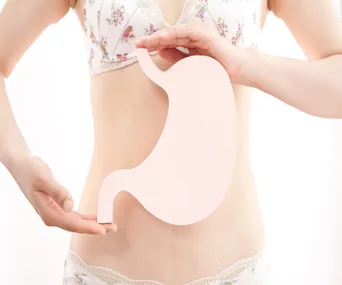Almost everyone has experienced bloating at some point in their life.
It’s that too-full feeling which leaves our bellies feeling swollen and our pants too tight.
The condition is common but can be very uncomfortable, especially if it’s ongoing.
Normally, people experience bloating after a big weekend of eating and overindulging but other times, it can be a sign of something else.
But is it something to be worried about?
Here, we take a look at some of its causes and what can be done to prevent it.

WHAT CAUSES BLOATING?
Bloating happens when the organs of your digestive system have become stretched.
This can be from liquid, gas or solids pooling in a particular part of your gut.
It’s usually caused by something in your diet so it’s important to understand the underlying cause of bloating in order to treat it properly.

MAIN CAUSES OF BLOATING
Dietary factors:
Excess wind
Certain foods can cause more wind than others so cutting down on these can help stop bloating.
The main culprits that cause wind are beans, onions, broccoli, cabbage, sprouts and cauliflower.

Constipation
Bloating is often a side effect of constipation.
This is mainly caused by not including enough fibre in the diet, not drinking enough fluids, or being inactive.
Changes to your daily routine, stress or a side effect of medication can also cause constipation.
The best way to alleviate constipation is to add more fibre to your diet or to try to incorporate a bit more exercise into your routine.

Swallowing air
This can happen without you realising.
People can swallow air in a number of ways including eating and talking at the same time or eating with your mouth open, sitting slumped over, consuming fizzy drinks and chewing gum.
So becoming more conscious of your air intake while eating will help.

POSSIBLE MEDICAL CONDITIONS
Coeliac disease
A common digestive condition for people who cannot absorb gluten in wheat, barley and rye is coeliac disease.
If you are suffering with coeliac disease, it is likely you will have other symptoms including diarrhoea, abdominal pain and fatigue.
It is best to see your GP for a blood test if you suspect you may have this.

Irritable bowel syndrome
People with irritable bowel syndrome often suffer bloating in the evening.
This doesn’t seem to be linked to excess wind but is thought to be down to the movement of contents through the bowel.

Food intolerance
Food intolerance can cause bloating.
This happens when your bowel either doesn’t properly empty after eating food which causes gas to be trapped, or too much gas is produced as a reaction to food.
The best thing to do is keep a food diary for a few weeks and note which foods cause bloating and which do not.

HOW TO TREAT BLOATING
QUICK FIXES:
Exercise
Exercising is a great way to get the bowels moving and release excess gasses trapped in the stomach.
Doing something as easy as a quick walk around the block can be enough to relieve gas, but regular exercise is always great to include into a healthy regime.

Peppermint tea
Peppermint is a herb commonly used to relieve digestive issues. Drinking a peppermint tea soothes the intestines and eases bloating.

Try an abdominal massage
Giving the abdomen a gentle massage can help the bowels to start moving.
Rubbing in a circular motion with light pressure from the hip bones up to the ribcage can help.
If the massage causes pain however, it’s best to stop.

Soak in a warm bath
The warmth of a relaxing bath can provide relief for a sore abdomen as well as reduce stress levels which can cause bloating.
DID YOU KNOW: The average adult produces about one to three pints of gas each day. These gasses pass through us and cause flatulence between 14 and 23 times per day.

LONG TERM PREVENTION:
While there are quick fixes to help relieve the feeling of bloating in the short term, they aren’t always as useful for long-term prevention of bloating.
Changes to the diet are the best way to improve bloating symptoms.
Gradually increasing the amount of fibre in your diet can alleviate that bloat, as can replacing fizzy drinks with still water.

WHEN YOU SHOULD SEE A DOCTOR
In very rare cases bloating can be a sign that there is something more serious wrong.
If the symptoms persist for days or weeks it may indicate an underlying health condition and it would be best to seek the help of a GP.
Bloating alone generally goes away on its own, but if it is paired with a number of other symptoms, it can be a cause for concern and worth a visit to the doctor.
They include:
● Abdominal pain
● Blood in the stools or dark, tarry looking stools
● Diarrhoea
● Heartburn
● Vomiting
● Unexplained weight loss

